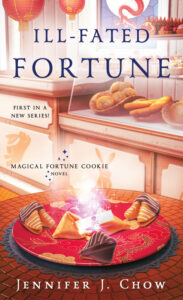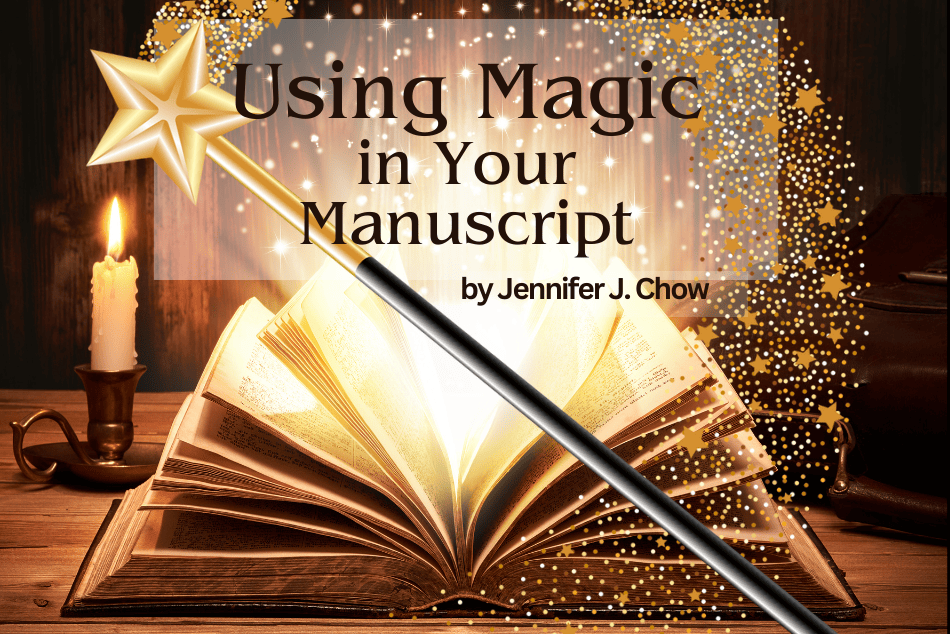Do you believe in magic? Even if you’re writing a novel set in the “real” world, you can make reality be your own special reality–by adding magic. But magic needs rules, and magic needs continuity, and magic needs to be just as real and believable as the rest of your fictional real world. Who better to tell her magical secrets than Jennifer J. Chow, the multi-award nominee and past president of National Sisters in Crime. Abracadabra!
Five Tips for Putting Magic in your Novels
By Jennifer J. Chow
My new series, Magical Fortune Cookie mysteries, has a lot of magic in it. The entire premise revolves around a Chinese bakery with a mother-daughter duo who are magical bakers. Elements of magic range from charmed pastries to a magical pet.
Are you thinking about adding some fun magic sparkle to your books? Here are five ways to do so:
Find a superpower
Opt for something unique and customized to your character. Since my series has a strong food theme, I wanted to do something with pastries. My protagonist, Felicity Jin, along with her mother, magically insert joy into their baked goods. Felicity is an even more unique Jin, though, because she has an individual gift not tied to the family’s inherited special skill. After Felicity creates a new recipe and bakes fortune cookies, she discovers a new talent: predictive power. The messages in her fortune cookies really do come true– including a murderous prediction.
Create an origin story
Share how the magic began for your character, expanding on the history behind the supernatural elements in your story. I included an intriguing passage in Ill-Fated Fortune on how the special magic was bestowed upon Felicity’s family. It’s a tale involving a small village and an exceptional act of sacrifice, which resulted in the magical talent being given to the original Jin ancestor.
Organize the magic
Use a system to keep track of the numerous factors behind the magic in your book. Just like in the ordinary world, the magical world should have some order. I like to keep a detailed spreadsheet to make sure I’m adhering to the previous rules of the world I’ve constructed—and to add in any new information. This magic system can be flexible since your character may grow in knowledge along the way. For instance, Felicity continues to explore and expand her newfound power throughout the course of Ill-Fated Fortune.
Insert a mentor
Sometimes it’s nice to have a magical expert—or two—in the novel. Felicity’s mom, Angela, often gives her daughter advice on how to insert joy into baked goods. This intimate family knowledge has been passed down through the generations and embellished by Angela’s own observations. Additionally, Felicity has a godmother, who acts in mysterious ways; Alma frequently offers wise, enigmatic sayings that prove helpful to Felicity in understanding her magic and her personal life.
Double down on the magic
Add extra layers of magic to the book by inserting more of the extraordinary into the storyline. You can even decide to do away with a real-world setting and instead build an entire fantastical universe for your characters. For me, I added a pinch more of magic by having a celestial bunny turn up on Felicity’s doorstep. The bunny descends from the moon and adds both magic plus Chinese mythology to the novel.
Are you trying magic in your story? Let’s talk about it on the Career Authors Facebook page!

Jennifer J. Chow writes cozies filled with hope and heritage. She’s been a finalist for the Agatha, Anthony, Lefty, and Lilian Jackson Braun Award. Her newest series is the Magical Fortune Cookie mysteries; the first book is Ill-Fated Fortune. Her other series include the L.A. Night Market Mysteries and the Sassy Cat Mysteries. Jennifer currently serves as Immediate Past President on the board of Sisters in Crime and blogs at chicksonthecase.com. She is an active member of Crime Writers of Color and Mystery Writers of America. Connect with her online and sign up for her newsletter at JenniferJChow.com
Fortune Cookie mysteries; the first book is Ill-Fated Fortune. Her other series include the L.A. Night Market Mysteries and the Sassy Cat Mysteries. Jennifer currently serves as Immediate Past President on the board of Sisters in Crime and blogs at chicksonthecase.com. She is an active member of Crime Writers of Color and Mystery Writers of America. Connect with her online and sign up for her newsletter at JenniferJChow.com





